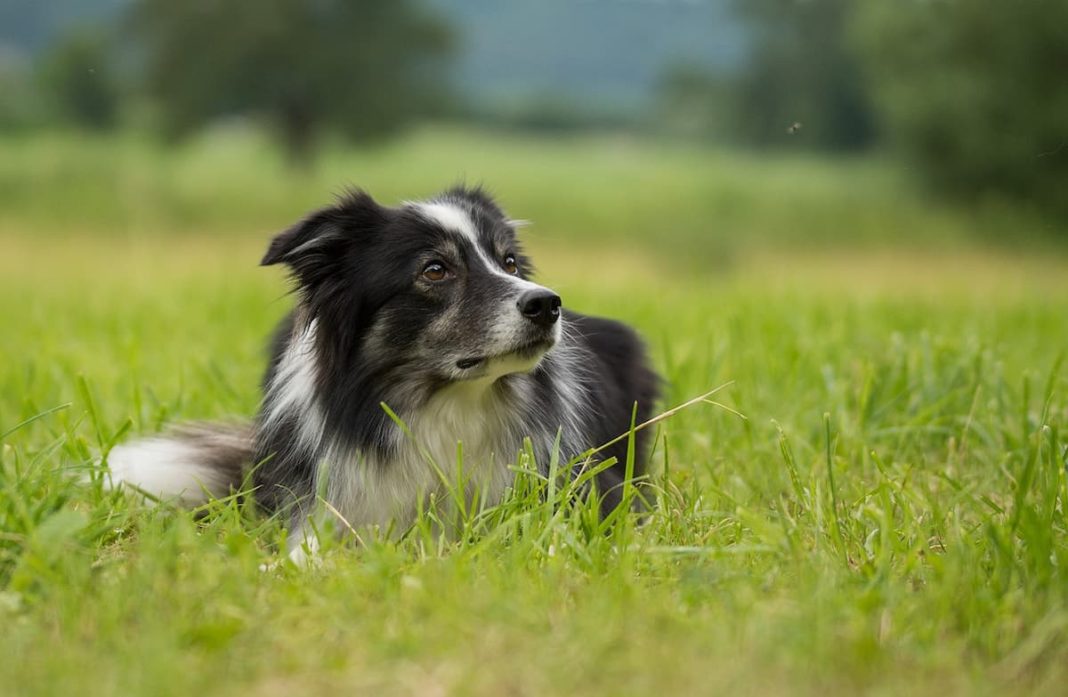Do Border Collies Eat Grass?
- Reasons Why Border Collies Eat Grass
- Can Collies Actually Digest Grass?
- Should You Let Your Border Collie Eat Grass? Is It Safe?
- Preventing Your Border Collie From Eating Grass
- Is Eating Grass A Sign Of Illness?
It’s not uncommon to see a border collie grab a mouthful of grass during a daily walk or if they’re romping through the local park. But what makes your border collie eat grass?
Many people believe that when a dog eats grass, that they’re trying to make themselves vomit. Many people believe that it’s an instinctive behavior in order for their dog to rid themselves of something they shouldn’t have eaten. While other owners believe that it’s an indication that the dog has an intestinal problem or upset stomach.
On the other hand, other dog owners believe that grass contains essential nutrients that their dogs instinctively know they need.
Reasons Why Border Collies Eat Grass
There have always been many theories, but because of the limited research that’s been conducted. So, the truth is that no one can know 100% for sure. However, scientists believe in a few theories leading to disproving some previous myths based on some research that was done.
Instinctive Behavior
Some scientists have speculated that eating grass is an instinctive behavior that they’ve hung onto since evolving from their wolf ancestors. Scientists know from research on wolves that between 2-10% of their stomach contents may contain plant material at any one time.
Supplementing a Missing Nutrient
In one notable case report, an 11-year-old dog had a 7-year history of eating plants and grass and vomiting afterwards. The problem was soon resolved after the dog was fed a high-fiber diet commercially available for dogs.
Normal Dog Behavior
Another study conducted by researchers found that grass-eating behavior was influenced by how hungry the dog was, along with the time of day. As a result, there was less grass-eating after the dog had eaten a meal, with increased grass-eating beforehand being fed. They also found that dogs eat grass less frequently later in the day. The researchers came to the conclusion that eating grass was normal behavior by dogs and was not indicative of an underlying illness.
Curiosity
Dogs, especially those that are younger, tend to explore most things with their mouths. So, eating some grass could just be something that they try, just like some children try to eat dirt. As a result, some dogs could learn to like the taste of grass.
Looking For More Attention
Other dogs could have learned that when they start to eat grass, their owners suddenly pay them more attention. To prevent this, you could talk to your dog more or offer them treats when they’re on grass. Sometimes, dog owners pull their dogs away from a patch of grass. Doing this could actually spur a dog to eat any grass as soon as they find it because it’s forbidden.
Can Collies Actually Digest Grass?
Border collies are primarily carnivores, meaning that they eat meat. Some recent studies have shown that dogs have evolved to have the ability to digest some carbohydrates as a result of co-evolving with humans. Carbohydrates are sugar, starches, and fibers that are mainly found in fruit, grain, vegetables, and milk products. But just because a dog can digest some carbohydrates, does this mean that a dog can really digest grass? The short answer is no, not really, as grass mainly passes through a dog’s intestinal tract undigested.
Should You Let Your Border Collie Eat Grass? Is It Safe?
There are several safety risks to take into account if your dog eats grass. Here are the most common.
Pesticides
Dog owners need to be sure that the grass their dog is eating doesn’t contain any pesticides, which may poison a dog. If you suspect that your dog has eaten grass that’s been treated with pesticide, bring your dog to your local veterinary clinic immediately! Dogs that have ingested grass that’s been treated with pesticides could show the following side effects:
- Excessive salivation
- Nausea
- Vomiting
- Diarrhea
- Decreased appetite
Fecal Material
Grass that’s contaminated with droppings from another dog, or animal, could be dangerous. Eating grass contaminated with fecal material could make your border collie sick.
Another consideration to take into account is your dog catching parvovirus. Parvovirus is normally transmitted via the fecal-oral route. Parvovirus could cause serious gastrointestinal disease in a dog or puppy that’s unvaccinated.
Fecal material from another dog or animal may also contain eggs or larvae from intestinal parasites. A dog that suffers from intestinal parasites could lose weight and have diarrhea. Puppies are more at risk of suffering from anemia and even death if the worm burden is large.
Preventing Your Border Collie From Eating Grass
Here are some tips for discouraging your collie from eating grass:
- Avoid grassy areas
- Time your outings for immediately after a meal
- Allow your dog access to grass later in the day
Try using positive reinforcement, while encouraging alternate behaviors. Every time you notice your dog trying to eat grass, calmly interrupt the behavior (Use diversion, rather than shouting) encouraging your dog to perform another behavior instead. For example, this could be touching your hand to earn a treat or chasing their ball.
Give your dog grass that only you have grown and only you can access, given that some researchers believe that it’s normal dog behavior. That way, you won’t have to worry about your dog ingesting any toxins or eggs and larvae of intestinal parasites.
Is Eating Grass A Sign Of Illness?
Eating grass may cause a dog to vomit sometimes, which leads a lot of people to believe that their dog eating grass could be a sign of illness, or a symptom of their dog not feeling well. However, studies carried out by the VCA found out that only 10% of dogs they tested were unwell before eating grass.
Based on this information, it’s generally believed that dogs aren’t eating grass in order to self-medicate an upset stomach. For most dogs, eating grass now and then shouldn’t be a big issue, but this could become a problem for a dog with grass allergies.
Conclusion
Although it seems strange to us, dogs eating some grass every so often is actually a common and natural behavior. Contrary to popular belief, eating grass isn‘t a sign that your dog is feeling unwell and trying to self-medicate. However, if you start noticing changes such as your dog attempting to eat grass more often, or in larger amounts, then you know it’s time to take your dog for a checkup with your local veterinarian.
Any dog that has the habit of eating grass should be on a monthly dewormer, along with regular fecal testing to look for intestinal parasites. There are certain intestinal parasites that need to be treated with different medications.









